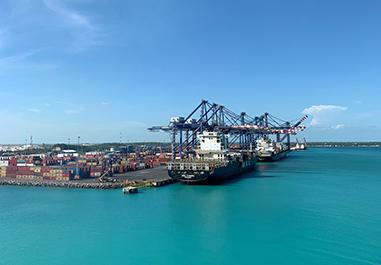
Operation of an agro-industrial terminal
From 2026, March 25th to March 27th

Master the technical, logistical and legal challenges of operating an agro-industrial terminal to optimise flows and meet industry requirements.
- Strengths and Advantages
- Programme
- Admission
- Tuition fees and funding
General Objective
- Master the overall environment of the terminal, its infrastructure, and its constraints.
- Understand the flows, equipment, and operational constraints.
- Grasp the specific responsibilities related to the port interface
- 45 years of expérience
- Quality, service and support
- Location in the first French container port
- An international renown
- Recognised centre of port excellence
- Catalog and taylor made trainings
- Good balance between theory and practice
- Wide network of experts
Understand the technical, logistical, legal, and strategic specificities of an agro-industrial port terminal.
Module 1: Overview of an Agro-Industrial Port Terminal
Module 2: Operational Organization and Industrial Challenges
Module 3: Role of the Site Manager in a Port Environment
The advantages of IPER
Programme
- Coordination between agricultural production, processing industry, and export.
- Types of Flows: Solid bulk (wheat, barley, rapeseed, oilcakes, corn)
- Liquid bulk (oils), containerized cargo (processed products, agricultural inputs)
- Seasonality & Natural Constraints: managing peak periods, weather, dust, humidity, and dynamic storage.
- Critical Infrastructure: Nautical and/or land access (river, rail, road).
- Role of Port Development in a Terminal’s attractiveness:
- Ship unloading/loading, internal transport (conveyor belts, elevators, hoppers), storage (silos, tanks).
- Information systems.
- Industrial safety & port security (ATEX risks, prevention plans, dust management, ISPS compliance – vessels, docks).
- Quality & traceability: Standards GMP+, ISO, HACCP. Management of batches, cross-contaminations, non-conformities.
- Management of teams and port service providers (stevedores, maintenance companies, shipping agents).
- Monitoring performance indicators (silo turnover rates, quay occupancy rate, average port call time, tonnage handled per workstation).
- Responsiveness and adaptability: Managing contingencies (weather, breakdowns, ship delays).
- Coordination with authorities (Harbor Master, Customs, Veterinary Services).
- Customer / cooperative / industrial relations: Transparency, reliability, lead times.
Overview of an Agro-Industrial Port Terminal
Operational Organization and Industrial Challenges
Role of the Site Manager in a Port Environment
Port visit
Registration
-
Well-being and Inclusion
Inclusion of students with disabilities
For several years now, EM Normandie has been committed to the inclusion of students with disabilities and has been striving to make it as easy as possible for them to learn, to continue their studies, to live socially within the school and to find employment. Specific training for its teachers and support services, school facilities, digital accessibility, etc. EM Normandie promotes values of equal opportunities and respect for differences, through the sharing of an inclusive culture and the continuous development of its practices. Are you disabled or have a chronic disabling illness? We can provide you with comprehensive support, whether it be in the context of your classes/exams, your search for internships, work-study programmes or jobs, or even in preparing for your expatriation.
Dates
From 2026, March 25th to March 27th - 3 days
How to register
Please complete the online registration form.
If you have any questions about your registration or your stay in Le Havre, please do not hesitate to contact us.
Tuition fees and funding
Tuition fees
€1,680.00 net of tax for 3 days
Our prices include the training programme, teaching materials, lunches and coffee breaks. Additional costs, including accommodation and dinners, are the sole responsibility of the learner.
Funding
Financing solutions are available. Please contact us for more information.

